Procol
Harum
Albums
reviewed on this page: Procol
Harum, Shine On Brightly,
A
Salty Dog, Home, Broken Barricades, Live In
Concert with the Edmonton Symphony Orchestra, Grand
Hotel,
Journey's End, Bridge of
Sighs, Procol's Ninth, No
More Fear of Flying, B.L.T.
Accidents can
have large results. Procol Harum
had an enormous
hit with their first single, the instantly recognizable "A Whiter Shade
of Pale" which fused a Bach-like organ line with ambitious lyrics.
Even before
their
next single, the drummer and guitarist had been replaced and the band
continued to merge R&B with progressive elements, a track which
became lighter and lighter as the years wore on. Robin Trower
played excellent
blues lines that were not overwhelming and Brooker's piano provided a
solid and interesting foundation under it all. This harmony lasted
for only two albums. By the time A Salty Dog rolled
around, Fisher was playing almost everything on his tracks, as well
as producing the album, and the group had branched away from
classical sounds. Fisher soon exited, had a not so-successful
solo career and is currently a computer programmer. Home
reunited Brooker's pre-Procol group, the
Paramounts, and the
result was pretty unexciting blues-rock, with Trower leading the
way.
After that Trower left (of course), and various other people drifted
in and out of the lineup afterwards, with Brooker, Wilson and Reid
the only constant members. At heart, Procol was always a
blues
based group, and as the progressive part wore off (in the post-Fisher
era) they focus on light blues with Brooker as the center of
attention. In the late 70s it was clear that they were
really
out of touch and called it a day.
Trower has
a solo career based on his talent to mimic Jimmy
Hendrix. Brooker and Fisher also recorded some solo work,
with varying results.
Personnel: Gary
Brooker (vocals,
piano), Keith Reid
(lyrics), Robin
Trower (guitar), Matthew
Fisher (organ, vocals), David
Knights (bass) and B.J.
Wilson (drums). Fisher
and Knights
quit after A Salty Dog (69-70).
Chris Copping
(organ, bass) replaced them starting with Home.
Robin
Trower quit after Broken Barricades and
was replaced by
Dave Ball. Alan Cartwright
(bass) added starting
with Live with the Edmonton Orchestra
album. Then Ball
was replaced with Mick Grabham by the
time Grand Hotel
came around. Cartwright quit, Copping
moved
over to bass, and Pete Solley came in on the
vacant keyboard
slot for their final outing, Something Magic.
Warning:
I find these reviews to be incoherent. I'll try to re-write them
sometime soon (est. summer ? at my pace).
 Procol Harum
(1967), ***1/2
Procol Harum
(1967), ***1/2
Procol
avoided
traditional progressive-rock longwindedness on their debut, headlined
in the US with "A Whiter Shade of Pale," the delightful
mixture of Brooker's soulful voice, Fisher's purloined Bach organ
lines, and Reid's garbled narrative lyrics. Nothing really
matches that one track, although the Bach blues and ambiguity theme
is continued with the pleasant "She Wondered Through the Garden
Fence" also boasts a great classical organ line.
Otherwise, the group takes advantage of Trower's blues skills,
("Cerdes (Outside the Gates Of) and "Something Following
Me") and a couple of humorous music-hall sendoffs (Dixieland
party on "Mabel" and "Good Captain Clack") are
pleasant and short. The only song not written by Brooker and
Reid, Fisher's instrumental "Repent Walpurgis" combines
Fisher's towering Bach and Trower's blues with impressive
results.
In general, the album finds the right balance dark classical music
and blues even if Reid's lyrics are lyrical nonsense
("Kaleidoscope"). Produced by Denny Cordell, who
later worked with Joe Cocker and Leon Russell, among others.
The
Westside
re-release of this (which I have) supposedly has a much better sound
then the original releases, and is in mono. It also has "A
Whiter Shade of Pale", its worthy follow-up "Homburg"
and a bunch of alternate takes.
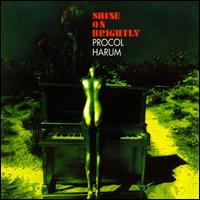 Procol
Harum: Shine on Brightly (1968), ****
Procol
Harum: Shine on Brightly (1968), ****
With
concept albums everywhere, and progressive rock just taking off,
Procol released Shine on Brightly. The first side
is split
between classical-influenced organ driven songs (such as "Shine
On Brightly") and blues-based numbers ("Wish Me Well").
Fisher is more prominent is the first category and Trower kicks ass
in the second, delivering excellent licks especially in "Rambling
On". Reid's lyrics are better, more coherent, and
downright amusing (the aforementioned "Rambling On").
The only out of place song is the odd label tribute "Magdalene
(My Regal Zonophone)", originally supposed to be their second
single. Shine on Brightly's second side
is Procol's
answer to Sgt. Pepper's:
a collection of songs strung in one track entitled "In Held Twas
In I". The entire thing is fabulous, with the linkages
working well, and only a touch of the era's omnipresent
sitar.
My favorite part is Fisher's "In the Autumn of My Madness",
with building organ, and backwards sound effects. Possibly
the
peak of Bach-rock.
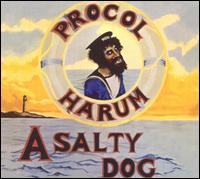 Procol
Harum: A Salty Dog (1969), ****1/2
Procol
Harum: A Salty Dog (1969), ****1/2
Abandoning artier methods like suites, Keith Reid's lyrics for A
Salty
Dog focus on
the ocean.
Reid had yet to reach his depressive trough, but the album's tone is
more relaxed and sad ("Pilgrims Progress" with its patented
Fisher organ line). The band divvied up the music writing, so
A
Salty Dog is more than just Brooker and Reid's work, and the
album has more diverse sounds. The album opens with the title
track, a grand, orchestrated song that was a bit too down and slow
for the times, but in hindsight seems brilliant. "Too Much
Between Us" sounds like it could have been CSN&Y with its
slow acoustic sound and vocal harmonies. Reid's nutty lyrics
are good, and sometimes funny (the chorus of "The Devil Came
from Kansas" which has a line like "When I'm trying to sell
you cheese"). Fisher also gets some of his best songs, the
Caribbean jam "Boredom", and the "Wreck of the
Hesperus". The latter is similar to the title track, yet I
think it is better with its driving piano line. Trower
delivers bluesy licks throughout with good taste ("The Milk of
Human Kindness"), even if his songs and vocals are sub-standard
(the straight blues "Juicy John Pink" and
"Crucifiction Lane"). But on the whole, the songs are
damn catchy and the playing good. Produced by Fisher, who
left
afterwards.
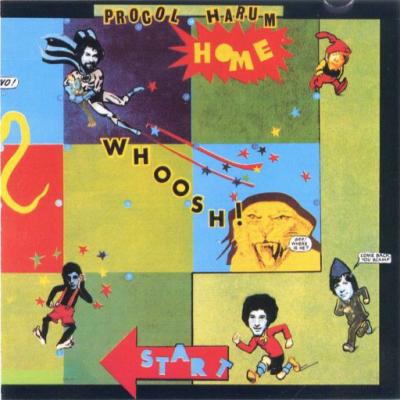 Procol
Harum: Home (1970), ***
Procol
Harum: Home (1970), ***
With
Fisher
gone, most of Procol's progressive elements promptly
disappeared.
Copping is a better bassist than Knights, and a worse organist than
Fisher, so the organ mainly just holds chords. Brooker also
ran
low on musical ideas, and everything sounds like a missing hard rock
part of Shine
On Brightly's "In
Held Twas In I", with minor chords popping up
everywhere. Not that this is necessarily bad, but it gets
tiring. Reid's lyrics had definitely turned very dark and
almost suicidal, with the epitome being the bastardly fun "Still
There'll Be More" ("I'll blacken your Christmas / And piss
on your door"). Trower shows signs of his future
Hendrix-impersonating solo career, but without any imagination
(repetitive riff syndrome) in "Whisky Train", but "About
to Die" provides a welcome relief from Brooker's increasingly
formulaic chord shifts. Some of it is still decent, like
"Barnyard Story" or the fabulous "Your Own Choice". The album's low
point is the overlong minor key drama-turned hymn
"Whaling Stories", which I noted as having that "same
damn chord progression" used in the rest of the album. The
rest is sadly filler. Produced by Chris Thomas.
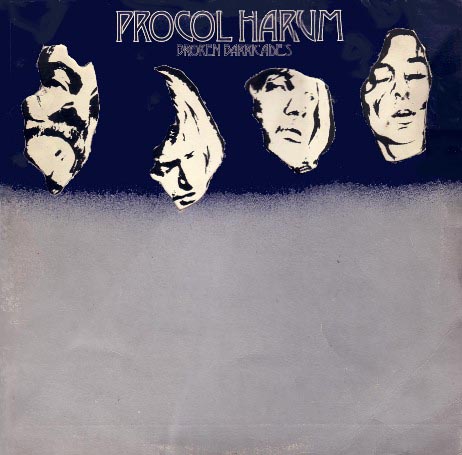 Procol Harum: Broken
Barricades
(1971) , **1/2
Procol Harum: Broken
Barricades
(1971) , **1/2
Thus
begins the long goodbye. Home
at least had anger, creepiness and horror - Broken Barracades
has few new ideas, relying on blues-rock with epic
tendencies. It is not a bad album, but one that will appeal
more to the blues-rock fans who like to have some arty
elements. Trower has one final showcase to strut his stuff,
and he's just as middling as always - a trippy Hendrix ripoff ("Song
for a Dreamer"), or parcel post blues ("Simple Sister", slide on "Poor
Mohammed"). This is compounded by the unwise decision to let
him sing his own songs. Brooker employs the "Still There'll Be More"
trick - standard blues-rock whlile he pleasantly sings Reid's lyrics
about abominations - with lesser results on "Luskus Delph".
Except this time, Reid wrote about ...sex, maybe. As always,
it's a fine line between poetry and obtuseness, and the lyrics are
rather off-putting. Reid was still wallowing at this point,
writing about destroyed worlds and the like, but minus Home's spite (for
better or for ?)
The band still throws in a modicum of prog or epic tendencies ("Luskus
Delphi" is the lite version), but they mistake repetition for dramatic
buildup ("Simple Sister", "Memorial Drive") with nothing to propel
them. Ah well, some good ideas are present - "Playmate of the
Mouth" is a good example of the blues meets Dixieland jazz (well suited
for Brooker's unflagging reliance on the ol' fashioned piano.), "Power
Failure" is a nice little blues number with a Wilson drum solo and
"Simple Sister" isn't half bad (and the piano line will stick in your
head). The album sounds good as well.
But, the writing is so blaise, perhaps the band should have chucked in
this whole prog/pop side and cast their lots as blues
musicians. Your idols absurd, indeed.
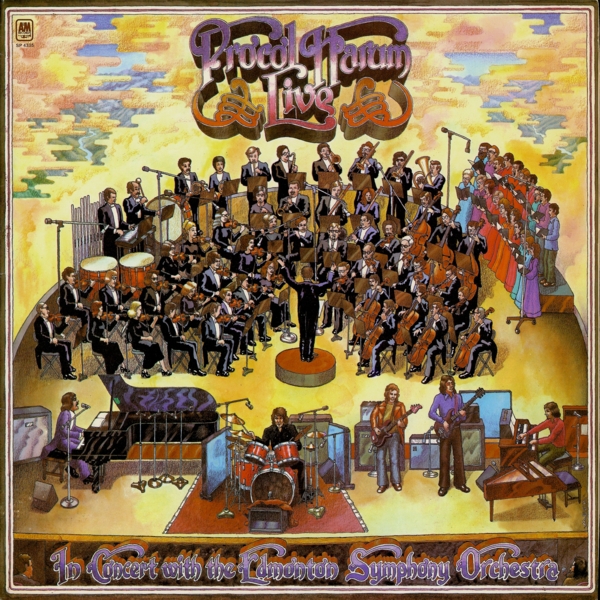 Procol Harum:
Live In Concert with the Edmonton Symphony Orchestra (1972)
Procol Harum:
Live In Concert with the Edmonton Symphony Orchestra (1972)
Recorded
with the Orchestra and a mass choir, and without Robin
Trower.
Most of Procol's material is suitable for use with a symphony,
especially "A Salty Dog" and "In Held Twas In I"
which takes up half the album. Nothing really different than
the studio versions, but still good. Dave Ball does a decent
job filling in for Trower, but not much is asked of him. Also
note that "A Whiter Shade of Pale" does not appear.
The single, a live version of "Conquistador" did reasonably
well, even though it sounds rough and kinda tame to me. This
is
also Cartwright's
inauspicious debut with the band, and Dave Ball's sole appearance.
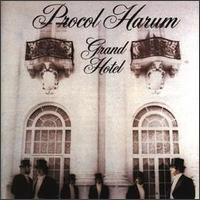 Procol
Harum: Grand Hotel (1973), **1/2
Procol
Harum: Grand Hotel (1973), **1/2
There
is a
marked decrease in quality here, a shift which always coincided with
Procol's loss of another original member. The replacements,
Cartwright, Copping and new entrant Mick Grabham (guitar), are pretty
much non-entities, especially the first two. Copping's organ
playing is treated with the respect it deserves - it is dissipated
and buried in the mix ("Tojours L'Amour"). Meanwhile,
Grabham doesn't really display any distinguishing characteristics,
other than he can play bluesy, loud and without Trower's
speed.
Cartwright can battle Dave Knights for a spot on trivia
cards.
Sure, there are some moments where the group hints at its glory days
(the chorus of "Grand Hotel" is one), but it's mainly
Brooker and Friends Play Piano-Rock, with lyrics by Keith Reid.
Not that it cannot be good ("A Rum Tale" or expectedly dark
"For Liquorice John"), but when one of the better tracks
sounds like a demented Hollies track about VD ("A Souvenir of
London" which is actually a good tune), the warning light should
go on. Reid even seems to be dropping off in quality; the
same
dark themes are there ("For Liquorice John" is about a
suicide for one), but he also delivers an ode to meat ("Bringing
Home the Bacon") and a warning against the dangers of Mighty
Mouse ("T.V. Caesar" which gets a bloated treatment by
Brooker). These even out on "Fires (Which Burnt
Brightly)", where the melody's strength and Christianne
Legrand's (of the Swingle Singers) guest vocals really help
compensate for Reid's lame anti-war lyrics. It is also a song
which desperately cries out for Matthew Fisher. Wilson does a
good job on drums (as always), and is probably the most consistently
interesting player on this album. All downhill from
here?
I hope not. Produced by Chris Thomas.
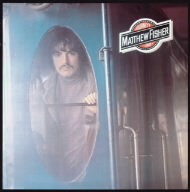 Matthew
Fisher: Journey's End (1973), **1/2
Matthew
Fisher: Journey's End (1973), **1/2
Decent
in
parts and horrid in others. Fisher's music is more mainstream
and his Bach flourishes are mostly gone, resulting in almost a Elton
John style. The opening track "Suzanne", a failed
single, is a fun rocking track. "Play the Game" is a
great loser vs. the world anthem, and "Interlude" sounds
like a keyboard version of Fleetwood Mac's "Albatross".
Most of the lyrics are thinly veiled references to his years with
Procol Harum (the many "friends" who let him down, and the
amusingly bad lyrics to "Going for a Song" about A Whiter
Shade of Pale). Occasionally he does get dragged down by his
bitter lyrics (the aforementioned "Going for a Song"), or
lost amidst too much orchestration (title track). The most
Procol-like song here is the instrumental "Separation"
which was recorded while he was still with the band. Fisher
sings, plays keyboards and guitar, with Geoff Swettenham on drums and
Mick
Hawksworth on
bass. Produced by Fisher.
Robin
Trower: Twice Removed From Yesterday (1973)
His
first solo album. Produced by Fisher.
Procol
Harum: Exotic
Birds &
Fruit (1974)
I
thought I might have this, but no.
Procol
Harum: BBC
Live in Concert (rec. 1974, rel. 2000)
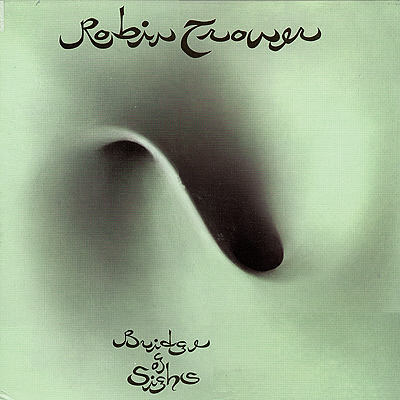 Robin Trower:
Bridge of Sighs (1974), **1/2
Robin Trower:
Bridge of Sighs (1974), **1/2
Trower
was
always in the second class of blues soloists, along with people like
Alvin Lee and that guy in Fleetwood Mac who joined a cult. It
is amazing is that Trower managed to parlay this into a solo career
more so than some of his more talented peers. This album does
prove that a guitar tone does not alone merit success. Trower
turned into a Hendrix clone by replicating his late period
tone.
Despite the cool nature of this talent, when combined with uninspired
backing (Reg Isidore on drums, and James Dewar on bass), and Trower's
formulaic lyrics and melodies, everything tends to blend
together.
Not to mention that Trower cannot solo like his adopted predecessor,
it is no wonder that most of the songs areindistinguishable.
The whole album has the same atmosphere, but no movement, and is
underproduced. The one big exception is of course the title
track, which is also the most produced track on the album, in
addition to being really cool. Produced by Fisher.
Trower
released
a pile of solo albums following this, of which I have more than I
care to admit.
Matthew
Fisher: I'll
Be There
(1974)
Not
for long. After some good press for Fisher's first
album, this was hastily recorded and flopped.
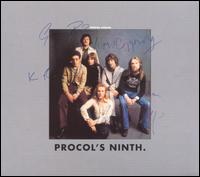 Procol
Harum: Procol's Ninth (1975), **1/2
Procol
Harum: Procol's Ninth (1975), **1/2
Can
someone
please explain to me how Procol were considered anywhere close to a
"progressive" band at this point? Other than the
title, the closest Ninth gets to progressive is
their final
hit "Pandora's Box", actually written back in the
Fisher-era, but otherwise it's blues after blues after blues built
around Brooker. Part of the problem is that everyone
surrounding Brooker is pretty darn anonymous, with exception of
Wilson. Who's Mick Grabham? Why, your ordinary
fungible
blues axe, of course. Give him a song to solo in and he will
show you exactly why they came up with the term "rock
journeyman." Procol even managed to exume the undead
bodies of R&B/pop kingpins Lieber and Stoller to produce this
one, giving them a mainstream sound. Not that the undead do a
whole lot, as everything sounds so clean, with horns and the like
cropping up now and again. What the heck was mainstream rock
in
1975 anyway? This might be the only example.
Anyways,
Ninth has a pristine rock sound, and the material
is decent
("Fools Gold", the undead's "I Keep Forgetting"),
but it is a very narrow album. It lacks the grandeur of Grand
Hotel, eliminating both the very good and the very
bad. All
that's left is some nice-sounding middle, with little upside.
There's a few nods towards contemporary sounds ("The Unquiet
Zone" sounds like a Deep Purple track in parts, or the reggae
breaks in "Without a Doubt"), but some rather questionable
choices as well. Take "The Piper's Tune", which has
the band re-creating the sound of bagpipes. Good for
them.
Does it have any real merit? Not really. What about
the
failed sports anthem "The Final Thrust"? Or their
cover of "8 Days a Week" which thanks to handclaps and
Brooker's piano turns into a more of a 50s sockhop number than the
original. Was there some sort of musical treasure hunt in
progress and that song was one of the items? Another sign of
the apocalypse - two of the songs deal with songwriting, or lack of
it ("Without a Doubt", "Typewriter Torment").
It is not as bad as it seems, it is just not overly good. It
gets the same rating as Grand Hotel because it
avoids that
album's mistakes, but at the cost of trimming down to a mediocre
blues-rock group.
Procol
Harum: Something Magic
(1977)
Referred to as Something
Tragic. Their last album.
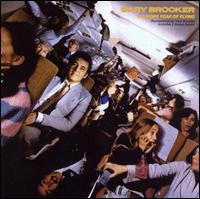 Gary
Brooker: No More Fear of Flying
(1979), **
Gary
Brooker: No More Fear of Flying
(1979), **
[Author's
Note: Maybe I'll give this a spin sometime soon as this review is a
couple of years old now.]
With Procol
broken up, as their main
songwriter and singer Brooker was the
natural choice to
have a solo career. But the result is not pretty.
Not
surprisingly he continues to work with Keith Reid for a few tracks,
but also has lyrics from Pete
Sinfield.
There are a few attempts to keep up with the times (the
disco-meets-boogie "Get Up and Dance" and the title track),
but they do not work well at all. Brooker sounds better when trying
ballads like "Pilot" or "Old Manhattan Melodies",
but he comes across as a second-rate Billy Joel. The last two
tracks are definitely the best, with good guitar on "Angeline"
(even if it steals the riff from the Who's
"I'm Free") and even better work on the old standard "Say
It Ain't So, Joe". The backup band had that slick 80s sound,
courtesy of Bruce Lynch on bass and Dave Mattacks on drums.
Veteran session player Tim Renwick plays guitar. Summary: Bleh.
Matthew Fisher (1980)
After
a
six year hiatus Fisher released another solo album.
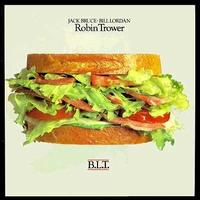 B.L.T.
(1981), ***
B.L.T.
(1981), ***
Second-tier
blues supergroup with Jack Bruce
on bass,
Bill Lordan on drums, and Trower, with Keith Reid writing almost all
the lyrics and it is surprisingly good. Bruce makes another
step towards the Guinness Record for Power Trio Memberships, and he
and Trower do make a good pair given their respective pasts.
Trower's playing has changed as well, going beyond impersonation to
more straightforward blues ("No Island Lost", "Endgame")
even though those are the least interesting parts of the
album.
But this is very much an early 80s album, and Trower accordingly
gives it a crisp New Wave production, as well as changing up his
guitar tone (the eerie "Carmen" with Bruce using
falsetto). There are only a few attempts to entirely break
the
blues base mold, and the ballad "Won't Let You Down" is an
excellent attempt at a crossover song. But beyond that one
can
hear the disco beat in "What Is It" or the funk influences
that have crept into Bruce's playing. Mostly it's just
blues-based rock that only occasionally stands out ("Into
Money"). Bruce does contribute one track, "Life On
Earth", which has a more complex structure than Trower's songs,
and yes, does sound like Cream. A blues album by "old
guys" that managed to be relevant.
Matthew
Fisher: Strange
Days
(1981)
Fisher's
last album, before one released in 1994.
Procol
Harum: The
Prodigal
Stranger (1991)
A
reunion record. Wilson is long dead (OK, 2 years), and I have
no idea who plays guitar. I don't really want to hear this
one.
Can't see
the joke? Return to the Music Page then...
 Procol Harum
(1967), ***1/2
Procol Harum
(1967), ***1/2
 Procol
Harum: Shine on Brightly (1968), ****
Procol
Harum: Shine on Brightly (1968), ****
 Procol
Harum: A Salty Dog (1969), ****1/2
Procol
Harum: A Salty Dog (1969), ****1/2
 Procol
Harum: Home (1970), ***
Procol
Harum: Home (1970), ***
 Procol Harum: Broken
Barricades
(1971) ,
Procol Harum: Broken
Barricades
(1971) ,  Procol Harum:
Live In Concert with the Edmonton Symphony Orchestra (1972)
Procol Harum:
Live In Concert with the Edmonton Symphony Orchestra (1972)
 Procol
Harum: Grand Hotel (1973), **1/2
Procol
Harum: Grand Hotel (1973), **1/2
 Matthew
Fisher: Journey's End (1973), **1/2
Matthew
Fisher: Journey's End (1973), **1/2

 Procol
Harum: Procol's Ninth (1975), **1/2
Procol
Harum: Procol's Ninth (1975), **1/2
 Gary
Brooker: No More Fear of Flying
(1979), **
Gary
Brooker: No More Fear of Flying
(1979), **
 B.L.T.
(1981), ***
B.L.T.
(1981), ***